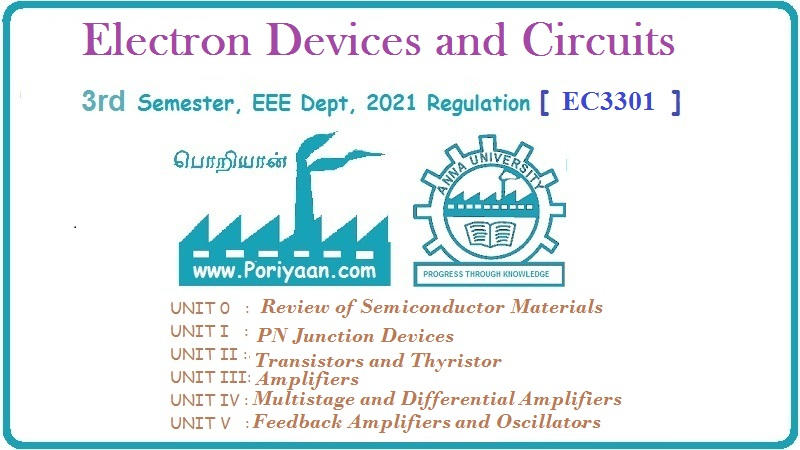Electron Devices and Circuits: Unit I: PN Junction Devices
Laser Diode
Symbols, Operation, Construction, Classification, Applications
• The term laser stands for light amplification by stimulated emission of radiation.
Laser Diode
AU
: May-15, 16, Dec.-17
•
The term laser stands for light amplification by stimulated emission of
radiation.
•
Laser light is referred to as coherent light which means that a light with a
single wavelength. This is opposite to the incoherent light, which has wide
band of wavelengths.
•
The light emitted by LED is an incoherent light whereas light emitted by laser
diode is a coherent light.
1. Construction and Symbol
•
The Fig. 1.21.1 shows the symbol and basic construction of laser diode.

•
It consists of pn junction formed by two doped gallium arsenide layers. The two
ends of the structure are flat and parallel with one end mirrored and one
partially reflective.
•
The length (L) of the junction is precisely related to the wavelength of the
light to be emitted.
2. Operation
•
The operation of laser diode is illustrated in the Fig. 1.21.2.

•
When the p-n junction is forward biased by an external voltage source, the
electrons move through the junction and recombines as in an ordinary diode.
•
When electrons recombine with holes, photons are released. These photons
strikes atoms, causing more photons to be released.
• As the forward bias current is increased, more electrons enter the depletion region and cause more photons to be emitted.
•
Eventually some of the photons that are randomly drifting within the depletion
region strike the reflected surfaces perpendicularly, so that they are
reflected back along their original path. These reflected photons are then
reflected back again from the other end of the junction.
•
This movement of photons from one end to another end continues for thousands of
times. During this movement, photons strike more atoms and release additional
photons due to the avalanche effect.
•
This activity of reflection and generation of increasing number of photons
results in a very intense, focused and pure beam of laser light which is formed
by the photons that pass through the partially reflective end of the pn
junction.
•
Each photon produced in such an emission process is identical to the other
photons in energy level, phase relationship, and frequency. Thus emission
process gives a intense beam of laser light with a single wavelength.
•
To produce a beam of laser light it is necessary to have a current through the
laser diode above certain threshold level. The current below threshold level
forces diode to behave as LED, emitting incoherent light.
3. Classification and Applications
•
The laser diodes can be classified according to material used to form the pn
junction layers.
•
The table 1.21.1 shows the type of laser diode, its peak power, wavelength and
typical application.

Review Questions
1. What is laser diode 1 Explain its construction working
principle and applications.
AU : May-15, 16, Dec.-17, Marks 8
2. State the various types of laser diodes and their application
areas.
Electron Devices and Circuits: Unit I: PN Junction Devices : Tag: : Symbols, Operation, Construction, Classification, Applications - Laser Diode
Related Topics
Related Subjects
Electron Devices and Circuits
EC3301 3rd Semester EEE Dept | 2021 Regulation | 3rd Semester EEE Dept 2021 Regulation
